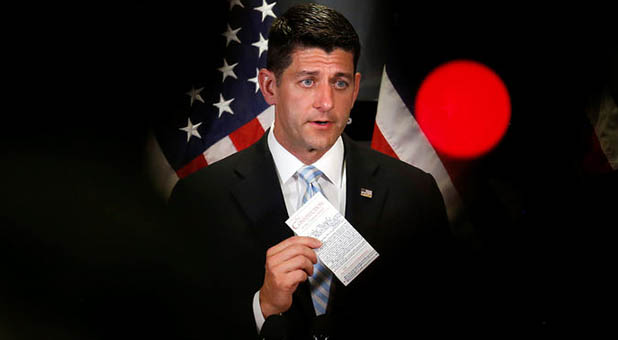Congress Is Considering Action in Reponse to Clinton Investigation
WASHINGTON (Reuters) – U.S. House Speaker Paul Ryan on Wednesday said lawmakers are examining whether there is any action they can take over Hillary Clinton’s email practices while secretary of state, saying it appeared she had received preferential treatment from the FBI.
Ryan, a Republican, said the House of Representatives would not “foreclose any options” when asked whether a special prosecutor was necessary to get to the bottom of the Democratic presidential candidate’s use of a private email server while she ran the State Department.
The Federal Bureau of Investigation said on Tuesday it would not recommend charges regarding Clinton’s email. This decision, Ryan said, “looks like” preferential treatment for Clinton. He said the announcement by FBI Director James Comey “raises more questions than provides answers.”
There was no immediate comment from Clinton’s campaign on Ryan’s remarks. The campaign said on Tuesday it was pleased with the FBI’s decision, noting that the candidate has said repeatedly that it was a mistake to use her personal email while secretary of state.
While recommending that no criminal charges be filed against Clinton, Comey on Tuesday rebuked the Democratic U.S. presidential candidate for “extremely careless” handling of classified information.
“He (Comey) did say that short of prosecution, some kind of administrative action might be in order,” Ryan said, adding: “I think it’s the least we can do, given how she was so reckless in handling classified material and sending classified information on insecure servers.”
“So look, I think that’s something that the administration should do on its own, but we’ll look into seeing if that’s something we can do as well,” Ryan said.
Ryan noted that two House committees are looking into the Clinton email matter — the Judiciary committee and the Oversight Committee, where Comey had been invited to testify on Thursday.
Ryan said he thought the Director of National Intelligence James Clapper should deny Clinton access to classified information during the campaign, “given how she so recklessly handled classified information.”
Ryan, who was the Republican vice presidential candidate in 2012, said that candidates get access to classified material on a regular basis once they leave their party conventions, which are both coming up this month.
Presidential candidate Donald Trump and other Republicans have pointed to the controversy over Clinton’s emails as evidence that Clinton considered herself above the law.
(Writing by Tim Ahmann; Editing by Bill Trott and Tom Brown)














































